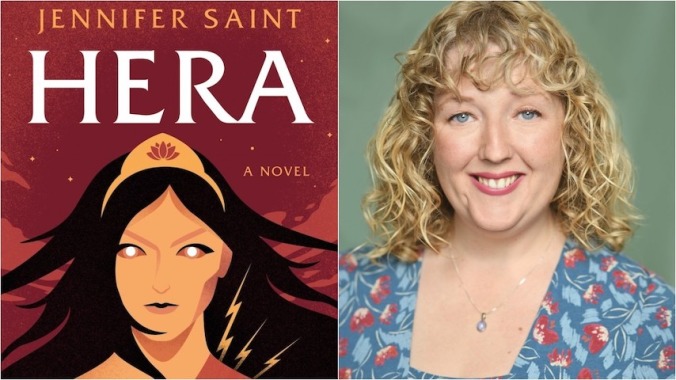Jennifer Saint Talks Hera and Putting the Queen of the Gods Center Stage
Photo: Emily Goldie Photography
Greek mythology retellings are one of the most popular trends in publishing right now. From contemporary reimaginings to female-focused reframings of classics by Homer or Aeschylus, these are stories we truly can’t seem to let go of, even thousands of years later. Jennifer Saint is one of the most prolific authors writing in this space today, and her stridently feminist reimaginings have given multiple sidelined, forgotten, or otherwise overlooked female figures from Greek legend the spotlight history has long denied them.
Her latest novel, however, is a bit of a swerve: Unlike her other books, Hera follows the story of an extremely well-known figure from the Greek pantheon, one that many readers not only likely already know quite a bit about but have formed strong opinions on. But what makes Saint’s book so compelling is that it’s one of the few stories about this particular goddess that actually puts Hera at its center, offering much-needed nuance and emotional depth to a figure who’s traditionally been portrayed as little more than a jealous, petty wife in larger stories about her husband.
We had the chance to chat with Saint herself about Hera, framing the Queen of the Gods’ story in a new way, what’s next for her as an author, and lots more.

Paste Magazine: Your previous books—Ariadne, Elektra, Atalanta—have been about female figures from Greek mythology who are either lesser known or whose stories have been sort of overshadowed by the men in their lives. But Hera is perhaps the most famous female figure in the entire Greek pantheon. What made you want to write a book about her?
Jennifer Saint: I’m always interested in finding the human heart within these ancient stories. For my previous heroines, I’d never felt that we were getting a fully developed portrayal of who they might have been, instead only seeing them as adjuncts to a hero’s story.
While these heroines had been misrepresented by being overlooked, Hera is the opposite— she’s everywhere in Greek mythology!—but she usually appears as a fairly one-dimensional villain, and this presentation didn’t ring true to me either. I wondered what might be behind her fearsome façade if you peel back some of the layers – and the more I started to look, the more intriguing and complex I found her to be.
Paste: Did you find it easier or more challenging to write a story about Hera, a figure that so many authors (both classic and modern) have already had takes on/opinions about?
Saint: The research was a lot more challenging because of the sheer scale of it. In some ways, that felt like a luxury as I had a wealth of myths and artwork and academic research to turn to for inspiration on Hera, as well as the historical record of her worship. I suppose the difficulty came in knowing when to stop researching and start writing!
Although there are a lot of representations of the goddess, there seemed to be a consensus on the kind of character she was—spiteful, angry, vengeful and jealous—and I found that the vision of Hera that was emerging in my mind was something different. I saw her as a powerful, famous woman who was resented and feared and so was always portrayed in terms of familiar misogynistic tropes, and I wanted to free her from those sexist stereotypes that aim to keep successful women down.
Paste: How did you decide which…version of Hera, for lack of a better term, was your north star? She appears in so many myths, plays, and poems by all sorts of writers, how did you figure out what her must-have traits were in your mind?
-

-

-

-

-

-

-

-

-

-

-

-

-

-

-

-

-

-

-

-

-

-

-

-

-

-

-

-

-

-

-

-

-

-

-

-

-

-

-

-








































